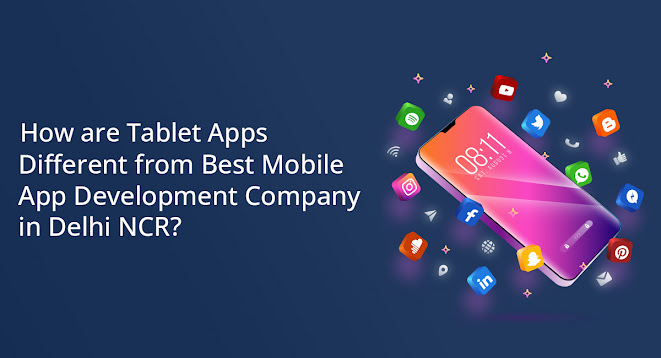Tablet apps are designed specifically for larger-screen devices, such as tablets and iPads, while mobile apps are designed for smaller-screen devices, such as smartphones.

There are several key differences between tablet apps and mobile apps, including:
Screen size and resolution: Tablet apps are designed to take advantage of the larger screen size and higher resolution of tablets, which allows for more detailed and interactive user interfaces.
User experience: The larger screen size of tablets allows for more intuitive navigation and more immersive user experiences, such as split-screen functionality and more detailed visuals.
Hardware capabilities: Tablets typically have more powerful hardware than smartphones, which allows for more complex and resource-intensive apps.
App development: Developing a tablet app can be more complex and time-consuming than developing a mobile app, as it requires a different set of design and development skills.
The best mobile app development company in Delhi NCR would have a team of experienced app developers and designers who can create high-quality apps for both tablet and mobile devices. They would also be familiar with the latest trends in mobile and tablet app design, as well as the technical requirements for developing apps for different platforms.
Differences Between Phone Apps and Tablet Apps
Screen size and resolution: Tablet apps are designed for larger screen devices, such as tablets and iPads, while phone apps are designed for smaller screen devices, such as smartphones. This means that tablet apps can take advantage of the larger screen size and higher resolution to display more detailed and interactive user interfaces.
User experience: The larger screen size of tablets allows for more intuitive navigation and more immersive user experiences, such as split-screen functionality and more detailed visuals. Phone apps, on the other hand, are designed to be used with one hand and to be operated easily with fingers.
Hardware capabilities: Tablets typically have more powerful hardware than smartphones, which allows for more complex and resource-intensive apps. Phone apps are designed to run on less powerful hardware and may need to be optimized for lower-end devices.
App development: Developing a tablet app can be more complex and time-consuming than developing a phone app. Tablet apps require a different set of design and development skills and can be more challenging to optimize for different screen sizes and resolutions.
Usability: Tablet apps are more likely to be used for productivity and content consumption, while phone apps are more often used for communication and quick access to information.
App Store Optimization: Tablet apps will have different user behavior, which means that optimization techniques for the app stores will be different for tablet apps.



Comments
Post a Comment